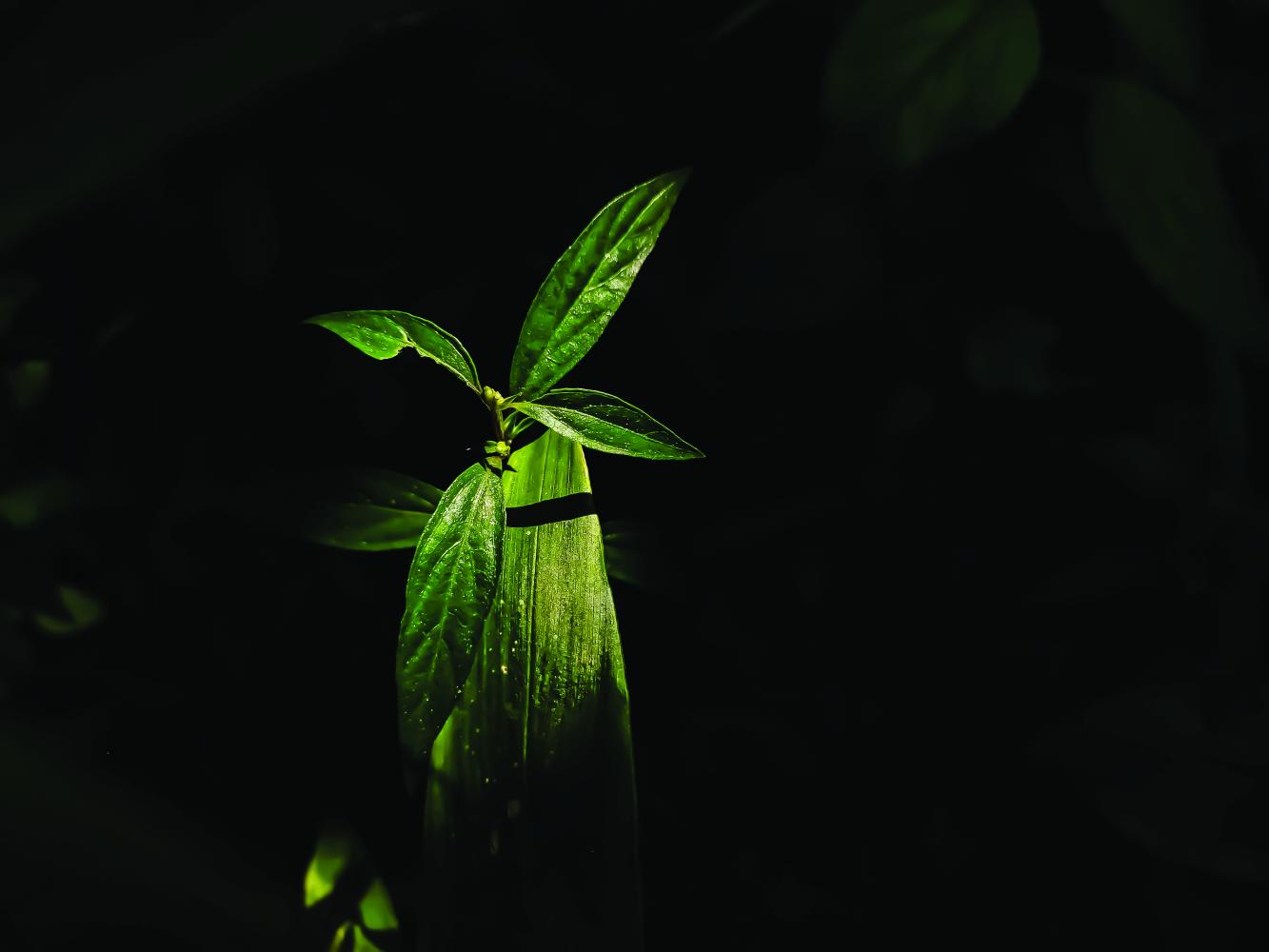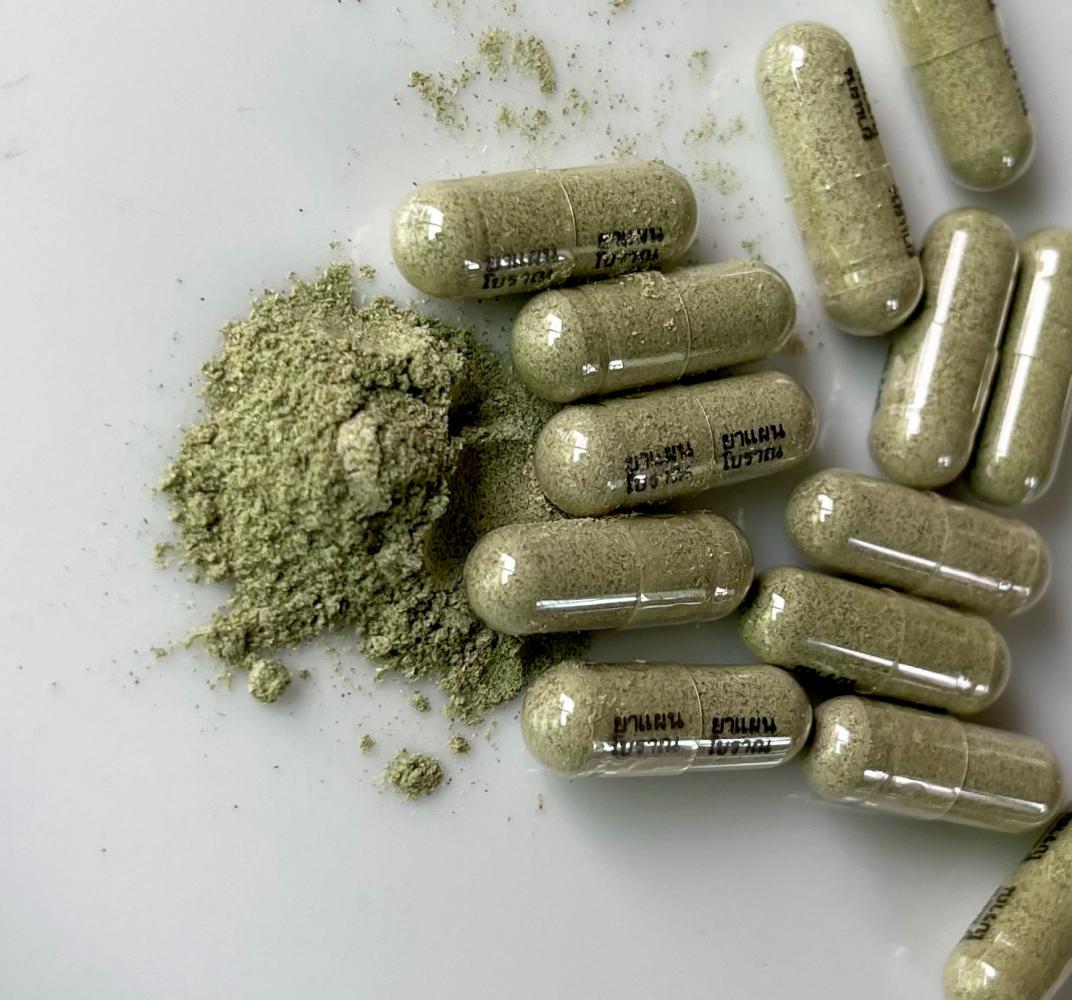Earlier this year, health-conscious customers were seen queuing up at a herbal retailer in a Bangkok neighbourhood in hopes of buying a few bottles of fah talai jone (green chiretta) capsules. With a surge of Covid-19 cases earlier this year, the herbal product made them feel secure and gave them hope of relying on something else besides Favipiravir.
Not everyone, however, got what they wanted.
"Stocks are limited. Each customer can purchase a maximum of two bottles," read a sign at the store's cashier. Despite this, the shop ran out of stock fairly quickly.
Over the past few years, an increasing number of Thais have turned to traditional herbs as a shield, if not a cure, against the novel coronavirus following waves of the pandemic that first hit the country in 2020. The extracts of not only fah talai jone but other garden herbs, many that people are already familiar with, such as kra chai (finger roots), turmeric, ginger and Indian gooseberry have become sought-after items amid public health crises.
The popularity of traditional herbs in the fight against the outbreak is, however, not without controversy. Many still frown upon medicinal plants, citing a lack of research and scientific proof to back up their efficacy against the life-threatening virus.
Pharmacist Anchalee Chuthaputti from the Department of Thai Traditional and Alternative Medicine under the Ministry of Public Health said at the 11th National Conference in Toxicology that Thailand is not the only country to turn to herbal medicines in the fight against Covid-19. Nations like China and India have also undertaken similar paths.
"Traditional medicine has had a role during Covid-19 because people use herbs as an immunity booster. In countries like China and India, traditional medicine is integrated with modern medicine in their fight against the disease," said Anchalee in a session titled "Herbal Medicines For Immunity". The 11th National Conference in Toxicology was organised recently by Mahidol University's Institute of Nutrition, the Thai Society of Toxicology, Thailand Risk Assessment Centre, the Thai Society of Clinical Toxicology, the Thai Environmental Mutagen Society, and Thailand Lab International.
In early 2020, China issued guidelines on how to treat Covid-19 with traditional Chinese medicine using certain medicinal formulas concocted specially for specific symptoms and organ systems. In India, the Ministry of AYUSH -- short for Ayurveda, Yoga, Naturopathy, Unani, Siddha, Sowa-Rigpa and Homoeopathy -- also released the National Clinical Management Protocol to care for Covid-19 patients using the practice of Ayurveda and yoga.

"They believe that better health prevents Covid-19 infection. Several organisations, therefore, joined forces to use herbs to treat mild cases and educate people about how to use herbs," the pharmacist added.
The global market of immune health supplements has grown dramatically due to the continuing outbreak. While the global market of dietary supplements to boost immunity was estimated at US$16.8 billion (556.2 billion baht) in 2020, it is expected to reach $27.6 billion by 2026 -- growing at an annual rate of 8.4%, according to data from Business Wire.
Known as the King of Bitters, fah talai jone has been in the spotlight following a surge of Covid-19 infection cases across Thailand. The Guidelines for Clinical Practice, Diagnosis, Treatment and Prevention of Healthcare-Associated Infection in Response to Patients with Covid-19 Infection also recommends healthcare personnel consider the use of fah talai jone in asymptomatic cases. However, the guideline does not recommend the use of green chiretta together with anti-viral medication over fears of side effects.
"It's a pity that the guidelines state this because it limits the use of fah talai jone in Covid-19 patients," Anchalee commented.
Fah talai jone has been in Thailand's National List of Essential Medicines since 1999 and is known to alleviate sore throat and common cold symptoms as well as diarrhoea with non-infectious causes. The Ministry of Public Health has approved the herb as a first-line drug against the common cold and prioritised the use of fah talai jone over unnecessary antibiotic prescriptions as a treatment against sore throat and flu according to its Rational Drug Use policy.
In recent years, several scientific reports have backed the efficacy of fah talai jone as a treatment. A few years ago, a study was published in PLOS One affirming the efficacy of fah talai jone (Andrographis paniculata) for symptomatic relief of acute respiratory tract infection in adults and children. The analysis, which involved 7,175 subjects, found that the herb was able to alleviate coughs and sore throat when compared to the placebo. Also, when it was prescribed alone or combined with usual care, the plant could improve symptoms of acute respiratory tract infection when compared to placebo, usual care and other herbal formulas.
In 1991, research was also published in the Journal Of The Medical Association Of Thailand on the efficacy of fah talai jone. The study involved 152 adult subjects suffering inflammation of the pharynx and tonsils who were randomly given either paracetamol, a low dose of fah talai jone or a high dose of fah talai jone for seven days. It was found that the efficacy of paracetamol or a high dose of fah talai jone provided more relief against fever and sore throat on the third day than its low dose counterpart.
"As for Covid-19, fah talai jone was able to reduce the length of symptoms from 11 days to eight days," Anchalee added. "The herb can alleviate coughing and enable the body to clear the virus."
Despite the universally recognised wonders of traditional Thai herbs, Anchalee suggested that the safe way to use herbs is to incorporate them into food and use them as a cooking ingredient.
"When cooking, consumers should opt for various herbs. Use them alternately every day instead of sticking to just one," she advised.
Different types of herbs do yield different effects. Some boost the body's immunity while others might also act as an anti-inflammatory or anti-viral agent. So before using herbs, it is advisable that consumers study related data carefully and check if it is safe.
"Certain herbs might have an enhancement effect while others might render a cure. If a specific herb is to be used as a cure, remember to not use it for too long," Anchalee concluded.

